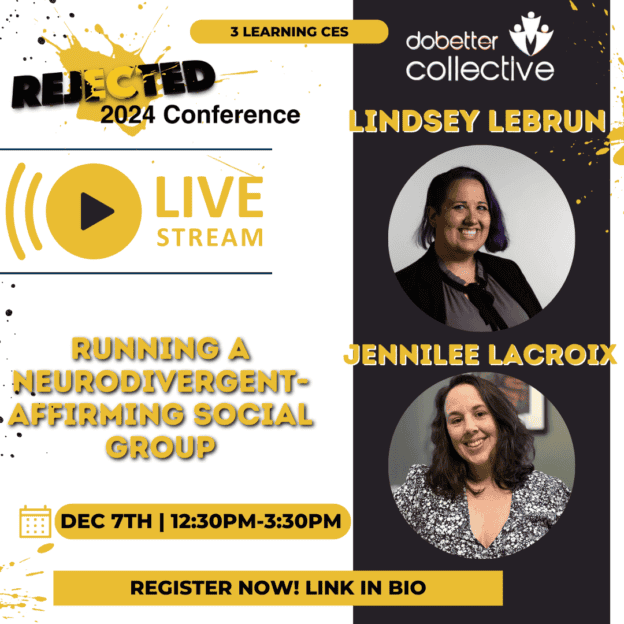Are you asking yourself often: Why are they saying no to things they like to do? Why won’t they choose any of the choices I am giving them, they like one of them?!
Recent research suggests social skill treatment does not often improve social abilities (Bishop-Fitzpatrick et al., 2014; Gates et al., 2017; Rao et al., 2008; Turner-Brown et al., 2008). Social skills training has faced significant criticism from the Autistic community (Roberts, 2021). Specific criticisms focus around the goals of social skills training focusing more on social camouflaging (Hull, 2019) and appearing “normal” instead of teaching functional skills, which empower Autistic people to navigate their environments while being able to be their authentic selves. This workshop will introduce the concepts of social camouflaging and masking, and their impacts on the well-being of Autistic people. A guided discussion on unmasking, including context, function, and privilege related to masking and unmasking will also occur. Emotional regulation strategies for the purpose of engaging in prosocial behaviors will be identified. Strategies of how to coregulate through ACT principles will be considered. Guidance surrounding implementing a support group will be discussed. Behavior skills training will guide the participant through how to implement ACT and restorative practices within a social group.
Learning Objectives:
- Participants will tact three different criticisms of traditional social skills training.
- Participants will identify two different effects of social camouflaging and masking on Autistic people.
- Participants will be able to implement three different ACT-related skills which contribute to conducting neurodivergent-affirming social skills groups.
PRESENTER(S): Lindsey LeBrun
Lindsey LeBrun is a behavior analyst with over a decade of experience working with autistic individuals. With an unwavering commitment to advancing neurodivergent-affirming and trauma-informed practices within the discipline of behavior analysis, Lindsey has contributed through their writings and presentations. Their specialization in neurodivergent-affirming workplace practices further establishes them as a preeminent thought leader in this arena. Lindsey also works as a school-based behavior analyst and is a professor. Their dedication to fostering supportive and inclusive learning environments permeates their work. Their passion for neurodivergent-affirming practices extends to their teaching, where they challenge conventional approaches and empower their students to adopt a more inclusive and trauma-informed perspective.
PRESENTER(S): Jennilee Lacroix
Jennilee is a Board Certified Behavior Analyst, adjunct professor, reflective practice consultant, and the owner and founder of Reinvent Behavioral Consulting, LLC. Her clinical practice centers the delivery of coaching and support to caregivers. Jennilee’s previous clinical experiences have included supporting young children, adolescents, adults, and caregivers in residential, educational, social service, and outpatient clinic settings. She previously served on the Executive Board as the Secretary for New Hampshire Association for Applied Behavior Analysis (NHABA). Jennilee is currently pursuing a PhD in Advanced Studies in Human Behavior at Capella University.

